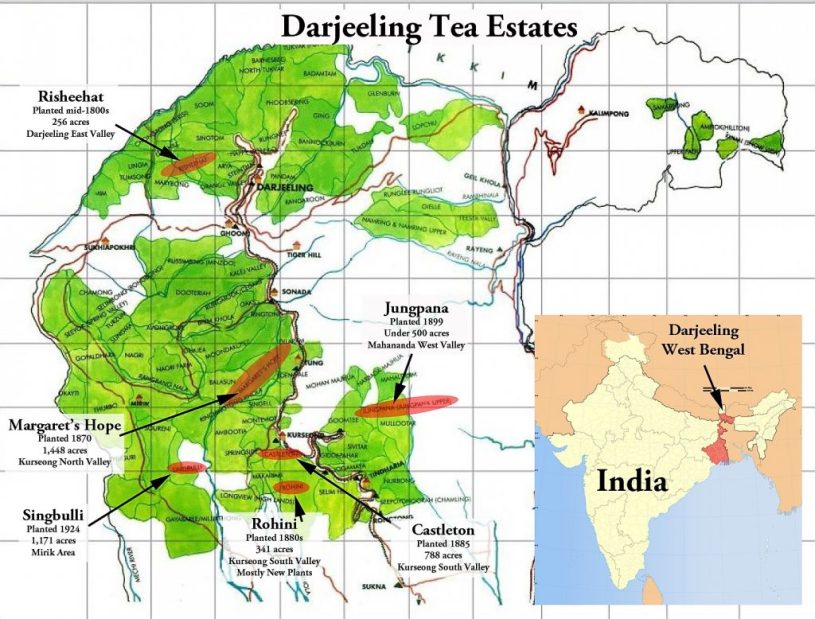Darjeeling Tea Production: Growing Concerns

Table of Contents
Climate Change and its Impact on Darjeeling Tea Gardens
Climate change poses a significant threat to Darjeeling tea cultivation. Global warming, characterized by rising temperatures and unpredictable rainfall patterns, directly impacts tea plant health, yield, and the overall quality of Darjeeling tea. These shifts disrupt the delicate ecosystem that's crucial for producing the high-quality leaves that define Darjeeling tea.
- Increased frequency of extreme weather events: Droughts and floods are becoming more common, damaging tea bushes and reducing yields. The delicate tea plants are particularly vulnerable to these extreme weather events, impacting both the quantity and quality of the harvest.
- Changes in flowering and plucking seasons: The traditional tea plucking seasons are shifting, impacting the timing of the harvests and potentially affecting the unique flavor profiles of Darjeeling tea. This unpredictability makes planning and production more challenging for Darjeeling tea gardens.
- Rising temperatures leading to reduced yields and increased susceptibility to pests and diseases: Higher temperatures stress the tea plants, making them more vulnerable to pests and diseases, requiring increased pesticide use, which has its own environmental and economic consequences.
- Shifting climatic zones potentially making Darjeeling unsuitable for some tea varieties: As temperatures continue to rise, some tea varieties may no longer thrive in the Darjeeling region, potentially leading to a loss of biodiversity and the characteristic flavors of this renowned tea.
Labor Shortages and the Aging Workforce
The Darjeeling tea industry is grappling with a severe labor shortage, exacerbated by an aging workforce. Many young people are migrating to urban areas in search of better employment opportunities, leaving a gap in the vital tea plucking workforce. This trend threatens the sustainability of Darjeeling tea production and the livelihoods of those involved in Darjeeling tea cultivation.
- Young people are less interested in tea plantation work due to low wages and demanding labor: The physically demanding nature of tea plucking, coupled with relatively low wages, makes it an unattractive option for young people. This is leading to a shrinking pool of potential tea pluckers.
- Lack of skilled labor affecting tea processing and quality control: Beyond plucking, the processing and quality control of Darjeeling tea require skilled labor. The shortage of experienced workers in these areas can negatively impact the quality of the final product.
- Challenges in attracting and retaining skilled workers: The industry needs to address the issue of fair wages and improved working conditions to attract and retain both skilled and unskilled workers.
- Need for improved working conditions and fair wages to attract new workers: Improving wages and working conditions is critical to attracting a new generation of tea workers and ensuring the long-term viability of the industry.
Sustainability and Ethical Concerns in Darjeeling Tea Production
The sustainability and ethical aspects of Darjeeling tea production are increasingly under scrutiny. Consumers are demanding more transparency and accountability regarding environmental impact and fair labor practices. This necessitates a shift toward sustainable tea production methods to ensure the preservation of this unique tea for generations to come.
- Growing demand for organic and sustainably produced Darjeeling tea: Consumers are increasingly seeking out organic and sustainably produced Darjeeling tea, reflecting a growing awareness of environmental and social issues.
- Need for responsible water management in tea gardens: Efficient water management is crucial in tea cultivation, and sustainable practices are needed to minimize water waste and protect water resources.
- Concerns over pesticide use and its impact on human health and the environment: The use of pesticides poses risks to both human health and the environment. Minimizing pesticide use and adopting integrated pest management strategies are crucial.
- Importance of fair trade practices ensuring fair wages and better working conditions for tea workers: Fair trade certification and other ethical initiatives are essential to ensuring fair wages and improved working conditions for tea workers in Darjeeling.
Economic Challenges and the Future of Darjeeling Tea
The economic viability of Darjeeling tea gardens is under pressure from fluctuating tea prices, competition from other tea-producing regions, and a lack of sufficient government support. The industry needs to adapt and diversify to ensure its long-term economic sustainability. This includes embracing innovative practices and diversifying income streams beyond traditional tea cultivation.
- Fluctuations in global tea prices impacting the profitability of Darjeeling tea gardens: The price volatility of tea on the global market significantly affects the profitability of Darjeeling tea gardens, impacting the livelihoods of farmers and workers.
- Competition from cheaper teas from other regions: Darjeeling tea faces stiff competition from cheaper teas produced in other regions, making it crucial to emphasize the unique quality and heritage of Darjeeling tea.
- Need for government initiatives to support Darjeeling tea farmers and producers: Government support, including financial assistance, research, and marketing initiatives, is crucial to ensuring the long-term viability of the industry.
- Exploring diversification strategies beyond tea production, such as tourism: Diversifying income streams by leveraging tourism and other related activities can enhance the economic resilience of the Darjeeling tea region.
Conclusion
The future of Darjeeling tea production is at a crossroads. Addressing the concerns highlighted – climate change, labor shortages, sustainability issues, and economic challenges – is crucial to safeguarding the unique quality and heritage of this iconic tea. Investing in sustainable practices, improving working conditions, and exploring innovative solutions are essential to ensuring the long-term viability of the Darjeeling tea industry. Let's work together to protect the future of Darjeeling tea production and its rich cultural legacy. Support ethical and sustainable Darjeeling tea brands and contribute to the preservation of this precious beverage.

Featured Posts
-
 A Special Little Bag The Unexpected Joy Of Minimalism
May 04, 2025
A Special Little Bag The Unexpected Joy Of Minimalism
May 04, 2025 -
 New Art Exhibition Launched By Athy Man Details And Dates
May 04, 2025
New Art Exhibition Launched By Athy Man Details And Dates
May 04, 2025 -
 Ufc 314 Fight Card Volkanovski Vs Lopes Ppv Event Breakdown
May 04, 2025
Ufc 314 Fight Card Volkanovski Vs Lopes Ppv Event Breakdown
May 04, 2025 -
 Bradley Cooper And Gigi Hadid Avoiding Di Caprio Drama
May 04, 2025
Bradley Cooper And Gigi Hadid Avoiding Di Caprio Drama
May 04, 2025 -
 Assessing The Mcu Strengths Weaknesses And Future Potential
May 04, 2025
Assessing The Mcu Strengths Weaknesses And Future Potential
May 04, 2025
